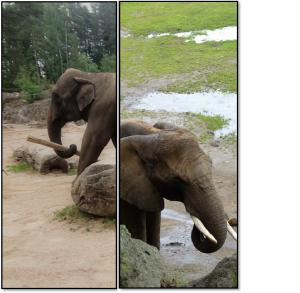
Elephants are difficult to keep in zoos due to their physical, psychological and social needs. Animals kept in zoos are restricted to a certain amount of space and substrate provided by the zoos and elephants are sometimes also kept in unnatural group compositions due to restricted space and conservation goals. Physical and social environment are thought to affect the resting behaviour of elephants. Elephants engage in both standing and lying rest and it has been suggested that elephants need to lay down to enter deep sleep and that they only rest lightly when standing up. This further suggests that being able to lay down to rest is important for elephants. Previous studies of the resting behaviour of elephants have suggested that Asian elephants have a preference for lying down to rest on softer substrates such as rubber flooring and sand and avoids lying down to rest on harder flooring such as concrete or tiled floor. It has also been suggested by previous studies that some individuals only rest if one or more conspecifics are within close proximity of them.
Previous studies on various species suggest that an animal´s resting behaviour can be used as an indicator of welfare. However, to use resting behaviour as an indicator of welfare, one needs to know how the observed species rests. Elephants have been studied for close to a hundred years but little is known about their resting behaviour and therefore have I studied the resting behaviour of African and Asian elephants housed indoors in Swedish zoos during the winter season.
Responsible for this page:
Director of undergraduate studies Biology
Last updated:
05/28/17
